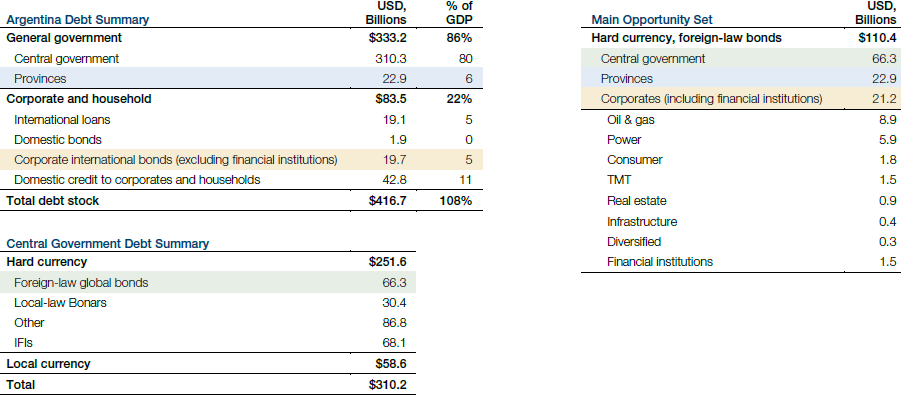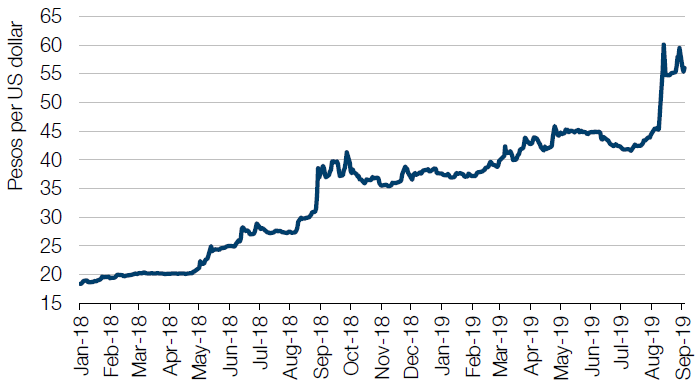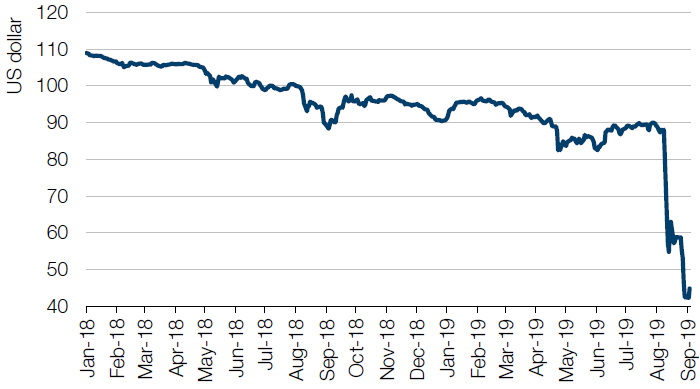The volatile situation in Argentina lends a hand to a growing and attractive opportunity set for distressed debt, in our view.
The volatile situation in Argentina lends a hand to a growing and attractive opportunity set for distressed debt, in our view.
September 2019
Introduction
With circa USD110 billion of hard currency foreign-law bonds trading at deeply discounted prices, Argentina once again sits centre stage in the global distressed credit arena. If the country defaults, it would be the fourth time it does so since 1989, and it would rank only second in size to Greece’s default in 2012.
This volatile situation lends a hand to a growing and attractive opportunity set for global distressed debt strategy, in our view.
The Background
In the wake of a currency and debt crisis in 2001, Argentina defaulted on its sovereign and corporate debt and was effectively shut out of international capital markets for nearly 15 years. In October 2015, President Mauricio Macri was elected on a market-friendly platform that quickly liberalised currency controls and began to rebalance the public utility framework. Soon after Macri took office, credit investors desperate for yield poured money into an Argentina starved for credit, and debt issuance exploded during 2016 and 2017.
Led by index-benchmarked dedicated emerging-market (‘EM’) funds, international investors piled into foreign-law, hard currency debt issued during this period, that included USD40 billion of sovereign bonds (including a 100-year bond), over USD10 billion of provincial bonds and over USD15 billion of corporate bonds.1
Figure 1. Argentina’s Debt Summary2

Source: JP Morgan, Hacienda, IMF, BIS; as of 28 August 2019.
As a result of that issuance, Argentina’s total private and public gross debt stock stands at USD417 billion (Figure 1). With a 2019 expected GDP of USD386 billion3, Argentina’s government debt-to-GDP ratio has swelled to 86%4 from 57% in 2017. As our main opportunity set, we have USD110 billion of hard currency bonds in New York and English law that include USD66 billion of sovereign bonds, virtually all of the USD23 billion in provincial bonds and USD21 billion in corporate bonds.5 Close to 90% of the stock of corporate bonds is highly concentrated in issuers from the economically strategic sectors of oil and gas, power, telecom and financial institutions.
Figure 2. The Decline of the Argentine Peso

Source: Bloomberg; between 1 January 2018 - 4 September 2019.
The Role of the IMF and Election Jitters
The most substantial non-market international participant is the International Monetary Fund. As concerns about ongoing international market access and internal monetary policy began to grow in mid-2018, the IMF stepped in with a stand-by agreement (‘SBA’) for USD50 billion, which was subsequently increased to USD56 billion later that year.
Market jitters continued into 2019 as polling began to herald the resurgence of Cristina Fernandez de Kirchner’s opposition party, broadly associated with corruption and inept management of the economy before Macri. As the presidential primary election results of 11 August were tallied, results showed that opposition candidate Alberto Fernandez (with ex-president de Kirchner as his running mate) had won 47.7% of the vote, a possibly insurmountable lead.
EM-dedicated long-only funds and several large hedge funds were caught overweight Argentine risk and saw bond prices plummet 30 cents overnight, as dealers and investors began to assess the news out of Argentina (including the current government and representatives of the opposition party), and the IMF.6 Importantly, the market also weighed technical supply/demand imbalances such as the potential for billions in repos being unwound, or the potential for forced selling by funds facing redemptions or with ratings or default restrictions.
Figure 3. Price of Argentinian Sovereign 6.875s, due 22 April 2021

Source: Bloomberg; as of 4 September 2019.
Since the election, a limited amount of selling has driven bonds down by a further 20 points, with some of the most liquid Argentine bonds now trading below 40 cents and many less liquid issues being quoted in the 30-60 cents range, despite the fact that there have yet to be any payment defaults.7 In a matter of weeks, Argentine bonds have shifted from trading on a yield-and-spread basis to a dollar-price basis, presaging a probable restructuring and reflecting views on expected recoveries.
From a technical perspective, we assess natural buyers for these distressed securities to be small relative to the size of the opportunity and scale of potential forced selling, even with likely additional demand from global hedge funds. Indeed, we estimate the size of the dedicated EM distressed capital to be a scant USD10-15 billion globally. In comparison, Argentine debt comprises the largest stock of USD emerging markets bonds of any country.
The Opportunity in Argentina
Despite Argentina’s reputation for serial defaults and low headline recovery rates, we believe the opportunities exist for potential returns by buying distressed assets at the right price, picking the right instruments and issuers and driving restructurings to create value.
While there are some differences from the previous crisis (e.g. sovereign bonds with collective action clauses, commodity prices, and balance of payments and reserve levels), there are also many commonalities. We see numerous opportunities in the current market within electricity distribution, power generation, gas transportation and the TMT sectors, to name a few; and expect to see even more if there is significant selling by the current investor base.
1. Source: JP Morgan Research.
2. Bonars are adjusted for retirement of USD12.8 billion from USD 2.6 billion repo repayment the week after the PASO elections: USD6 billion 24s, USD 4 billion 25s and USD2.8 billion 37s.
3. IMF SBA 4th review: 2019E GDP of ARS21,232 billion at 55 ARS/USD.
4. Including central government debt and province debt.
5. Including USD1.5 billion of international corporate bonds issued by financial institutions which are not tabulated as part of debt to GDP calculations to avoid double-counting.
6. https://www.wsj.com/articles/argentine-vote-slams-u-s-bond-funds-11565721325
7. S&P has deemed the recent extension on maturities of local law treasury bills for institutional investors to be a selective default, and Argentina has announced an intention to pursue a ‘voluntary’ re-profiling of external debt. There have been no payment defaults to date.
You are now exiting our website
Please be aware that you are now exiting the Man Institute | Man Group website. Links to our social media pages are provided only as a reference and courtesy to our users. Man Institute | Man Group has no control over such pages, does not recommend or endorse any opinions or non-Man Institute | Man Group related information or content of such sites and makes no warranties as to their content. Man Institute | Man Group assumes no liability for non Man Institute | Man Group related information contained in social media pages. Please note that the social media sites may have different terms of use, privacy and/or security policy from Man Institute | Man Group.